 “In recent days, the Church exerted pressure over the Government of Kerala and succeeded in closing down 700 bar hotels and 35 of the 350 retail liquor outlets of the State Beverages Corporation. Now only 24 bar hotels are functioning. … The majority of bar hotels closed down were owned by the Hindu community. The Christians lost nothing! Instead, the government permitted them to open wine parlours in every nook and corner of the state. This is the greatest victory of the Church.” – Prof C. I. Issac
“In recent days, the Church exerted pressure over the Government of Kerala and succeeded in closing down 700 bar hotels and 35 of the 350 retail liquor outlets of the State Beverages Corporation. Now only 24 bar hotels are functioning. … The majority of bar hotels closed down were owned by the Hindu community. The Christians lost nothing! Instead, the government permitted them to open wine parlours in every nook and corner of the state. This is the greatest victory of the Church.” – Prof C. I. Issac
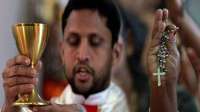 It is said that the Churches in India, particularly of Kerala, are ‘a committed force’ to fulfil the dreams of the father of the nation – Gandhiji – for a spirit-free Bharat. At the time of his struggle against the British Raj, the Churches in India, notwithstanding theological differences, extended spiritual, moral and material support for the continuation of the Raj in India.
It is said that the Churches in India, particularly of Kerala, are ‘a committed force’ to fulfil the dreams of the father of the nation – Gandhiji – for a spirit-free Bharat. At the time of his struggle against the British Raj, the Churches in India, notwithstanding theological differences, extended spiritual, moral and material support for the continuation of the Raj in India.
After independence, the Church adjusted to the new reality and became blind supporters of the Congress party of Jawaharlal Nehru and are still loyal to them. Our discussion concerns the Church’s dubious approach towards the policy of prohibition.
Indian Churches are at the helm of all anti-liquor organisations in all states, though they are running more wineries than the distilleries in India! Each diocese has a winery in order to fulfill the said requirements of their priests, nuns and laities. The paradox is that they are nowadays running after the state governments to enhance the capacity of their wineries. The justification for this demand is that the Christian population has enhanced considerably.
In the last century, Kerala Christians were 22 per cent of the population; now they are 19 percent. Census reports show that the Christian population in India and particularly Kerala is in negative growth phase. The negative growth phenomenon is prevalent particularly amongst Syrian Christians, a major group of Kerala, identified by 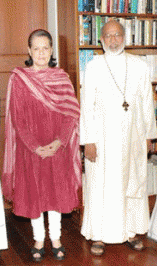 demographers as suffering from the ‘Parsi Syndrome’. Then what is the basis of the priestly demand for more wine?
demographers as suffering from the ‘Parsi Syndrome’. Then what is the basis of the priestly demand for more wine?
 demographers as suffering from the ‘Parsi Syndrome’. Then what is the basis of the priestly demand for more wine?
demographers as suffering from the ‘Parsi Syndrome’. Then what is the basis of the priestly demand for more wine?
According to reports in regional newspapers, the Archdiocese of Ernakulam-Ankamali of Syro-Malabar Catholic Church submitted an application to the state Excise Department seeking to enhance its wineries’ production capacity from 1600 liters to 5000 litres. (See The Hindu, Kochi & Mathrubhumi, Kottayam, 20 May 2015). Cardinal Mar George Alencherry, a leader of the Prohibition Movement in Kerala, is the applicant!
To Christians, wine is a holy drink because it was served during Jesus’ Last Supper. So it is a necessary item to fulfill the requirement of their spiritual needs. Hence nobody questions the use of wine in communion. The consumption of wine during Holy Mass by a laity is less than one drop. So what is the rationale behind the Church demand to vastly enhance production of wine?
The alcohol content in wine is 6 to 7 percent. The wine consumption promoting Churches usually blame certain Hindu temples’ practice of offering country liquor such as toddy, which contain less or equal alcohol to wine, to their deities. In recent days, the Church exerted pressure over the Government of Kerala and succeeded in closing down 700 bar hotels and 35 of the 350 retail liquor outlets of the State Beverages Corporation. Now only 24 bar hotels are functioning. This is the greatest victory of the Church.
The majority of bar hotels closed down were owned by the Hindu (Ezhava) community. The Christians lost nothing! Instead, the government permitted them to open wine parlours in every nook and corner of the state. Now Kerala is not only ‘God’s Own Country’ but also the land of ‘wine and beer’. Naturally, the Church which condemned the liquor policy of the government now kept discreet silence and extended moral support to the government’s new policy of wine and beer.
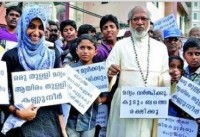 The Church is clearly conflicted in this matter. Its frontal organisation to fight against the curse of liquor, the Kerala Catholic Bishops Council Prohibition Movement (KCBC), proposed to conduct a two-day training camp of its prohibition workers on 18 and 19 May 2015 at theRenewal Centre, Kaloor, Ernakulam. The entire 31 dioceses from all the three rites were represented in this camp. (Mathrubhumi, Kottayam, 16 May 2015).
The Church is clearly conflicted in this matter. Its frontal organisation to fight against the curse of liquor, the Kerala Catholic Bishops Council Prohibition Movement (KCBC), proposed to conduct a two-day training camp of its prohibition workers on 18 and 19 May 2015 at theRenewal Centre, Kaloor, Ernakulam. The entire 31 dioceses from all the three rites were represented in this camp. (Mathrubhumi, Kottayam, 16 May 2015).
Ironically, before the camp ended, the Church applied for enhancement of the capacity of one winery. The other dioceses and missionary organisations will soon follow in the footsteps of the Archdiocese of Ernakulam-Ankamali.
We can only acclaim, “Long lives the Church’s liquor policy”, or pray, “Forgive them, Father! They do not know what they are doing”. (Luke, Chapter 23, verses 32). – Vijayvaani, 1 June 2015
» Prof C. I. Issac is a member of the Indian Council for Historical Research (ICHR)
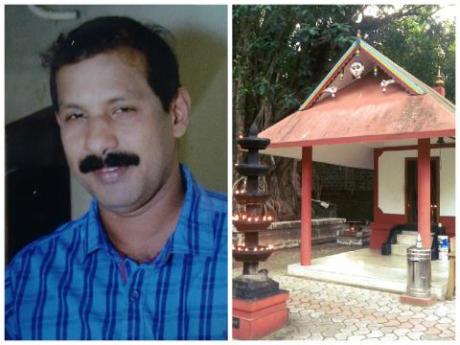
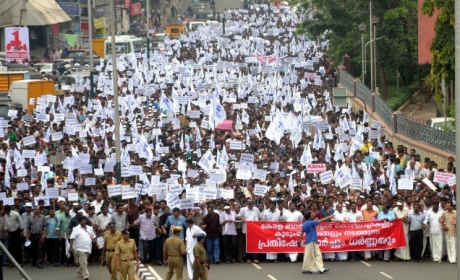

Is Kerala Really growing??? In today’s world to stop human mind from drinking alcohol is impossible. To implement what Supreme Court it should give ample amount of time at least 1 year. Suddenly people who depend upon the bar business cannot shift. I think 200 meters is good. Why should they allow bars and liquors and spend some amount of money for the policemen to check drunk and drive. Bars should get closed early will help I think.
ReplyDeleteLiquor business gives the maximum profit in all the states. Supreme Court should appoint some commission and try to study. Few people will appreciate if bars are closed, few will not, maybe mostly. Often I read the latest Kerala news, breaking Kerala news about this issue. Still this decision is not the proper solution. Reducing the amount of alcohol percentage will help I think. Thank you just my opinion.